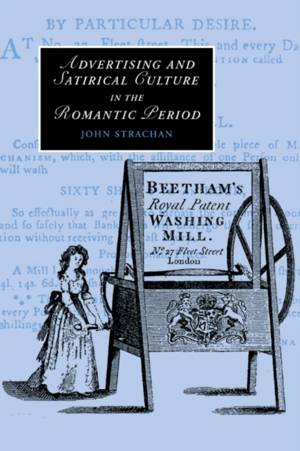
Bedankt voor het vertrouwen het afgelopen jaar! Om jou te bedanken bieden we GRATIS verzending (in België) aan op alles gedurende de hele maand januari.
- Afhalen na 1 uur in een winkel met voorraad
- In januari gratis thuislevering in België
- Ruim aanbod met 7 miljoen producten
Bedankt voor het vertrouwen het afgelopen jaar! Om jou te bedanken bieden we GRATIS verzending (in België) aan op alles gedurende de hele maand januari.
- Afhalen na 1 uur in een winkel met voorraad
- In januari gratis thuislevering in België
- Ruim aanbod met 7 miljoen producten
Zoeken
Advertising and Satirical Culture in the Romantic Period
John Strachan
€ 74,95
+ 149 punten
Uitvoering
Omschrijving
Advertising, which developed in the late eighteenth century as an increasingly sophisticated and widespread form of brand marketing, would seem a separate world from that of the 'literature' of its time. Yet satirists and parodists were influenced by and responded to advertising, while copywriters borrowed from the wider literary culture, especially through poetical advertisements and comic imitation. This study to pays sustained attention to the cultural resonance and literary influences of advertising in the late eighteenth and early nineteenth centuries. John Strachan addresses the many ways in which literary figures including George Crabbe, Lord Byron and Charles Dickens responded to the commercial culture around them. With its many fascinating examples of contemporary advertisements read against literary texts, this study combines an intriguing approach to the literary culture of the day with an examination of the cultural impact of its commercial language.
Specificaties
Betrokkenen
- Auteur(s):
- Uitgeverij:
Inhoud
- Aantal bladzijden:
- 370
- Taal:
- Engels
- Reeks:
- Reeksnummer:
- nr. 74
Eigenschappen
- Productcode (EAN):
- 9780521293068
- Verschijningsdatum:
- 16/06/2011
- Uitvoering:
- Paperback
- Formaat:
- Trade paperback (VS)
- Afmetingen:
- 152 mm x 229 mm
- Gewicht:
- 539 g

Alleen bij Standaard Boekhandel
+ 149 punten op je klantenkaart van Standaard Boekhandel
Beoordelingen
We publiceren alleen reviews die voldoen aan de voorwaarden voor reviews. Bekijk onze voorwaarden voor reviews.









